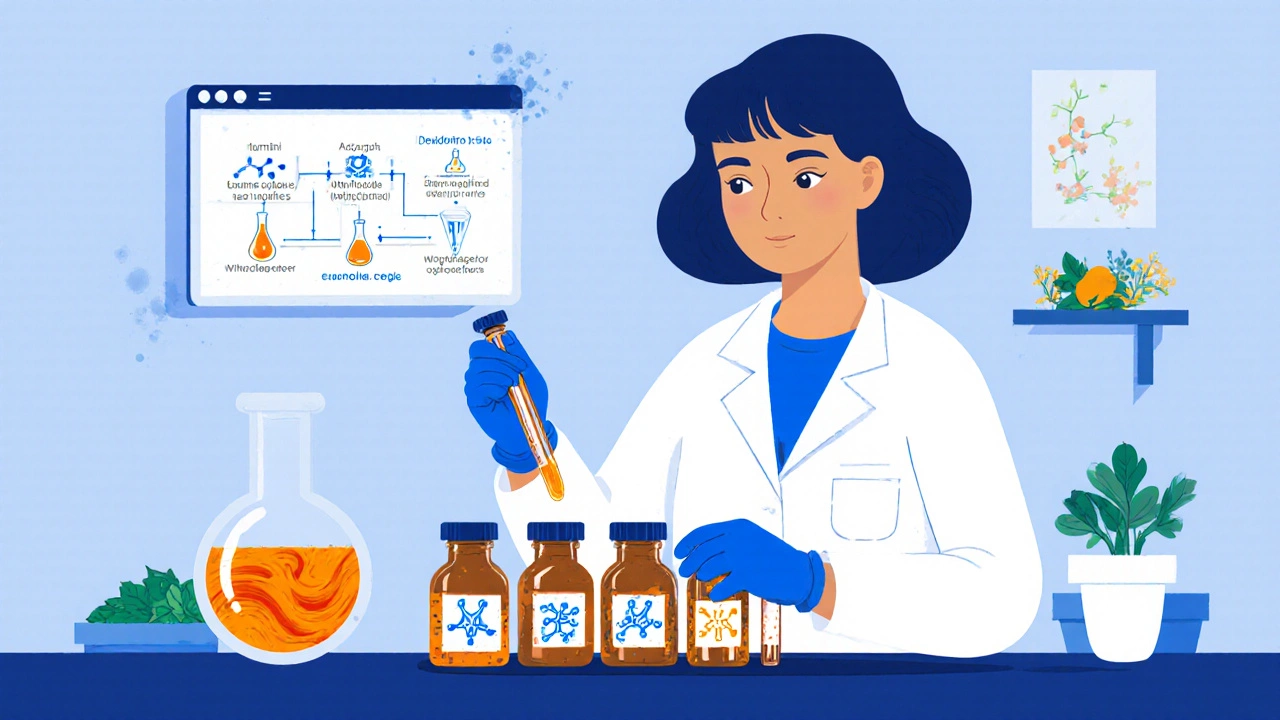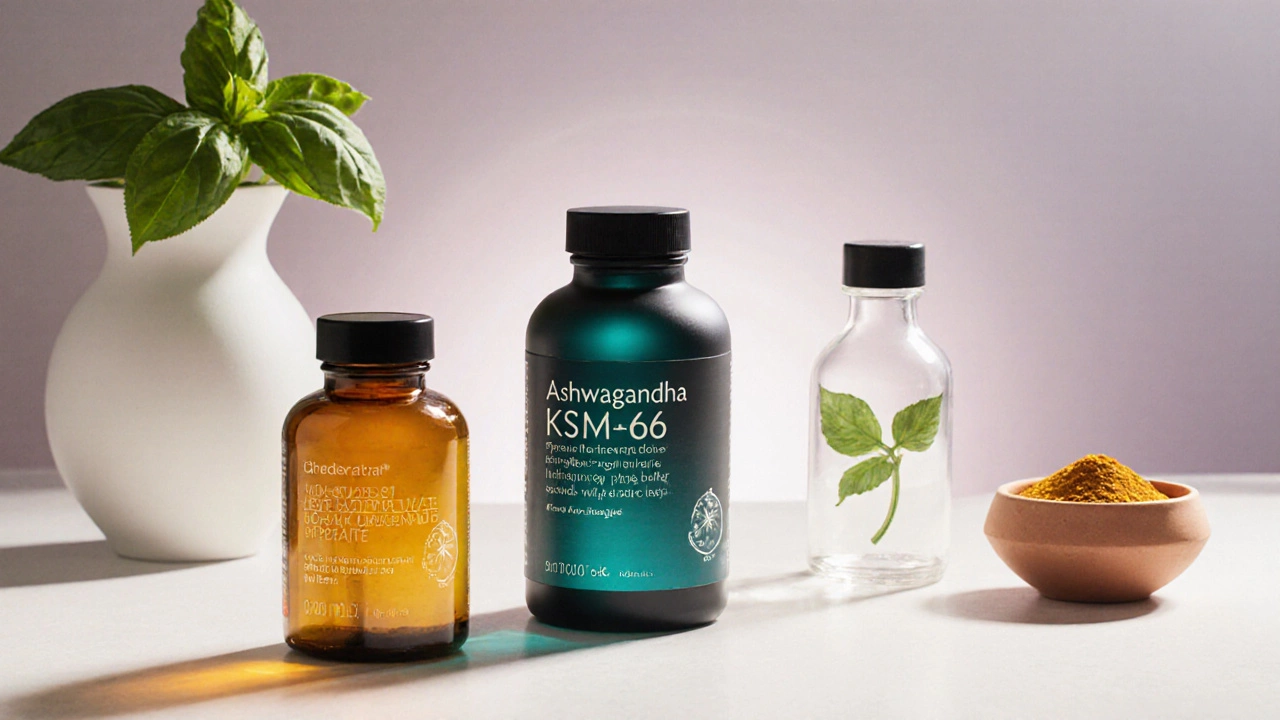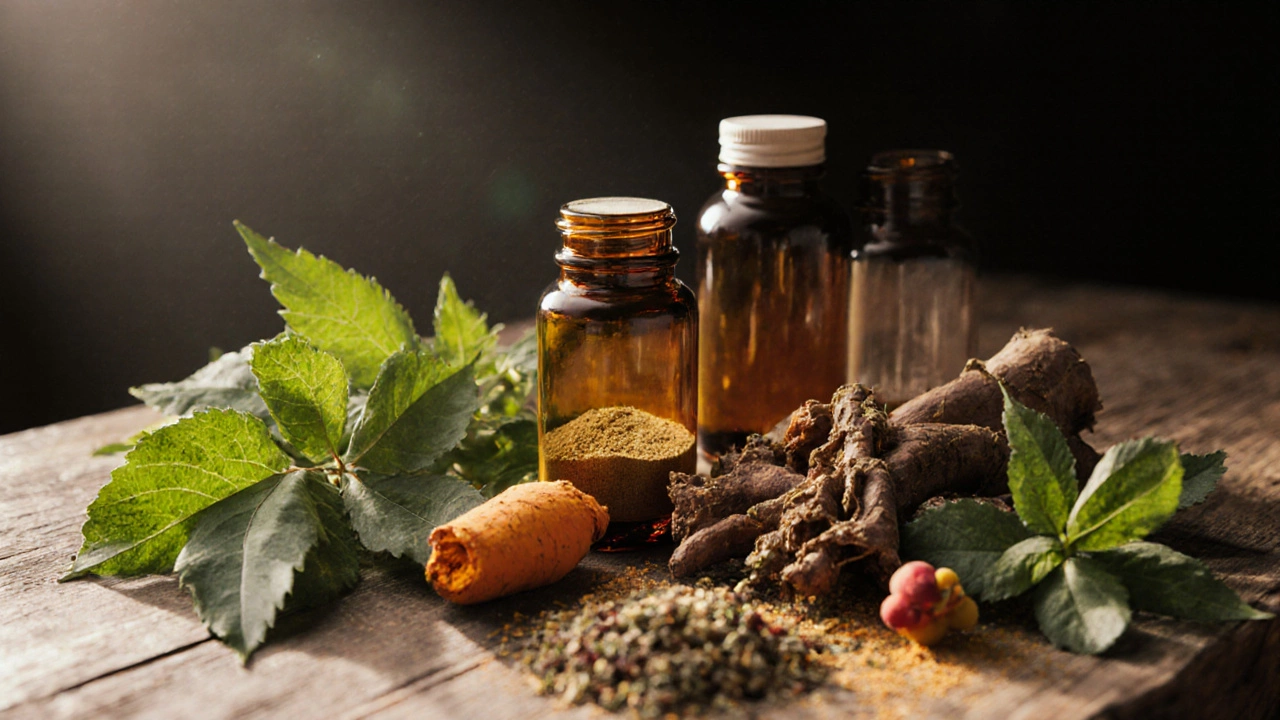Herbal Supplement Checker
Quality Assessment Results
When you hear the term herbal health supplements, you probably picture a bottle of powdered roots or capsules promising better sleep, more energy, or stronger immunity. But what exactly are they, how do they differ from regular vitamins, and should you trust the claims on the label? This guide breaks down the basics, looks at popular options, and gives you a straight‑forward checklist for picking safe, effective products.
Quick Summary
- Herbal health supplements are plant‑derived products intended to support bodily functions.
- Key active compounds are called phytochemicals, which can act as antioxidants, adaptogens, or anti‑inflammatories.
- Evidence varies: some herbs have solid clinical data, others rely on tradition.
- Safety hinges on proper dosage, purity, and regulatory oversight (e.g., India’s FSSAI).
- Choose brands that disclose sourcing, standardised extracts, and third‑party testing.
Herbal health supplements are a subset of dietary supplements that use plant parts-leaves, bark, roots, or seeds-to deliver bioactive compounds. Unlike prescription drugs, they are not meant to treat disease but to complement a balanced diet and lifestyle.
What Makes a Supplement "Herbal"?
At the core, herbs are plants used for their therapeutic properties. When manufacturers extract the active constituents and formulate them into pills, powders, or teas, the product becomes a herbal health supplement. The extraction method (water, alcohol, CO₂) influences the concentration of phytochemicals such as flavonoids, alkaloids, or terpenes.
Common Types and Their Typical Uses
Below are some of the most frequently consumed herbs and what they’re traditionally used for. The list isn’t exhaustive, but it covers the majority of products you’ll see on pharmacy shelves or online marketplaces.
- Ashwagandha (Withania somnifera) - Adaptogen for stress relief and stamina.
- Turmeric (Curcuma longa) - Anti‑inflammatory; often combined with black‑pepper extract for better absorption.
- Ginkgo biloba - Improves circulation and may support cognitive function.
- Holy basil (Ocimum sanctum) - Balances blood sugar and reduces cortisol.
- Triphala - A blend of three fruits used for gentle digestive support.

How Do They Work? Understanding Active Ingredients
The therapeutic effect of an herbal supplement depends on its active ingredient. For instance, curcumin is the main anti‑inflammatory molecule in turmeric, while withanolides drive the stress‑modulating benefits of ashwagandha. Manufacturers often standardise extracts, meaning the product guarantees a specific percentage of the active compound (e.g., “standardised to 5% withanolides”). This standardisation helps ensure consistency between batches.
Dosage is another crucial factor. The dosage recommended on the label is based on traditional use or clinical trial data. Too little may be ineffective; too much can lead to unwanted side effects or interactions with prescription meds.
Benefits Backed by Science
Not every herbal claim survives scientific scrutiny, but a handful have robust support:
- Turmeric/curcumin: Multiple meta‑analyses show modest reductions in joint pain comparable to NSAIDs, especially when paired with piperine.
- Ashwagandha: Randomised trials in stressed adults report a 30‑40% drop in cortisol and improved sleep quality.
- Ginkgo biloba: A 2022 systematic review found slight memory benefits in mild cognitive impairment, though effects fade in healthy young adults.
For many other herbs, evidence remains anecdotal or limited to small pilot studies. When evaluating a product, look for references to peer‑reviewed clinical studies on the label or company website.
Safety, Regulation, and Quality Assurance
In India, the Food Safety and Standards Authority (FSSAI) classifies herbal supplements as dietary supplements. They must meet Good Manufacturing Practices (GMP) and list ingredients clearly, but they are not evaluated for efficacy before hitting the market. That’s why you’ll see a wide quality range.
Key safety considerations:
- Purity: Look for third‑party testing (e.g., USP, NSF) that checks for heavy metals, pesticides, and microbial contamination.
- Standardisation: Guarantees a defined amount of the active compound.
- Interactions: Herbs like St.John’s wort can affect drug metabolism; always consult a healthcare professional if you’re on prescription meds.
- Allergies: Some formulations contain fillers like soy or gluten.

Choosing the Right Product - A Practical Checklist
| Factor | What to Look For | Why It Matters |
|---|---|---|
| Ingredient Transparency | Full botanical name, part used, extraction method | Prevents mislabelled or adulterated products |
| Standardised Extract | e.g., “5% withanolides” for Ashwagandha | Ensures consistent potency across batches |
| Third‑Party Testing | Certificates from USP, NSF, or similar | Verifies purity and absence of contaminants |
| Manufacturing Practices | GMP‑certified facility | Reduces risk of cross‑contamination |
| Clinical Evidence | References to peer‑reviewed trials | Supports the claimed health benefit |
By ticking off each row, you’ll be able to spot high‑quality supplements and avoid those that rely on vague marketing.
When to Use Herbal Supplements and When Not To
Herbal products work best as a complement to a nutrient‑rich diet, regular exercise, and adequate sleep. They’re not a substitute for prescribed medication. If you have chronic conditions-diabetes, cardiovascular disease, autoimmune disorders-talk to your doctor before starting any new herb, especially if you’re already on medication.
Top 3 Herbal Supplements for 2025 (Based on Sales and Research)
- Standardised Turmeric (95% curcumin + piperine) - Ideal for joint health and inflammation.
- Ashwagandha KSM‑66 (5% withanolides) - Best‑selling adaptogen for stress and sleep.
- Ginkgo biloba (24% flavone glycosides) - Popular for mild cognitive support.
These three have the strongest blend of clinical data, consumer demand, and quality‑assurance certifications as of October2025.
Frequently Asked Questions
Are herbal supplements the same as vitamins?
No. Vitamins are single nutrients like vitaminC or D, while herbal supplements contain complex mixtures of plant‑derived phytochemicals that may act on multiple pathways.
Can I take multiple herbal supplements together?
Generally you can, but watch for overlapping active ingredients that could increase potency too much (e.g., two anti‑coagulant herbs). Start with one product, monitor how you feel, then add another if needed.
How long does it take to feel the benefits?
It varies. Adaptogens like ashwagandha may show improvements in stress levels within 2‑4 weeks, while anti‑inflammatory effects of turmeric might need 8‑12 weeks of consistent use.
Are herbal supplements safe for pregnant women?
Safety data are limited for many herbs. Some, like ginger, are considered safe in moderate doses, while others (e.g., goldenseal) are not recommended. Always consult a prenatal care provider.
Do I need a prescription to buy herbal supplements?
No. In most countries, including India, herbal supplements are sold over the counter. However, reputable vendors often require a brief health questionnaire to ensure safe use.
Armed with this information, you can decide whether herbal health supplements fit into your wellness routine and, if so, pick products that deliver real value without risking your health.



